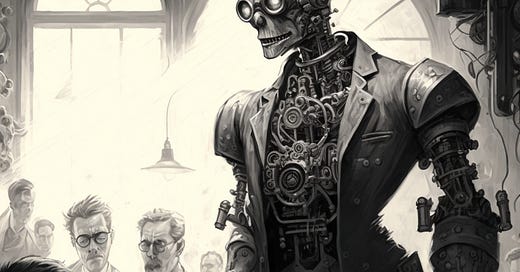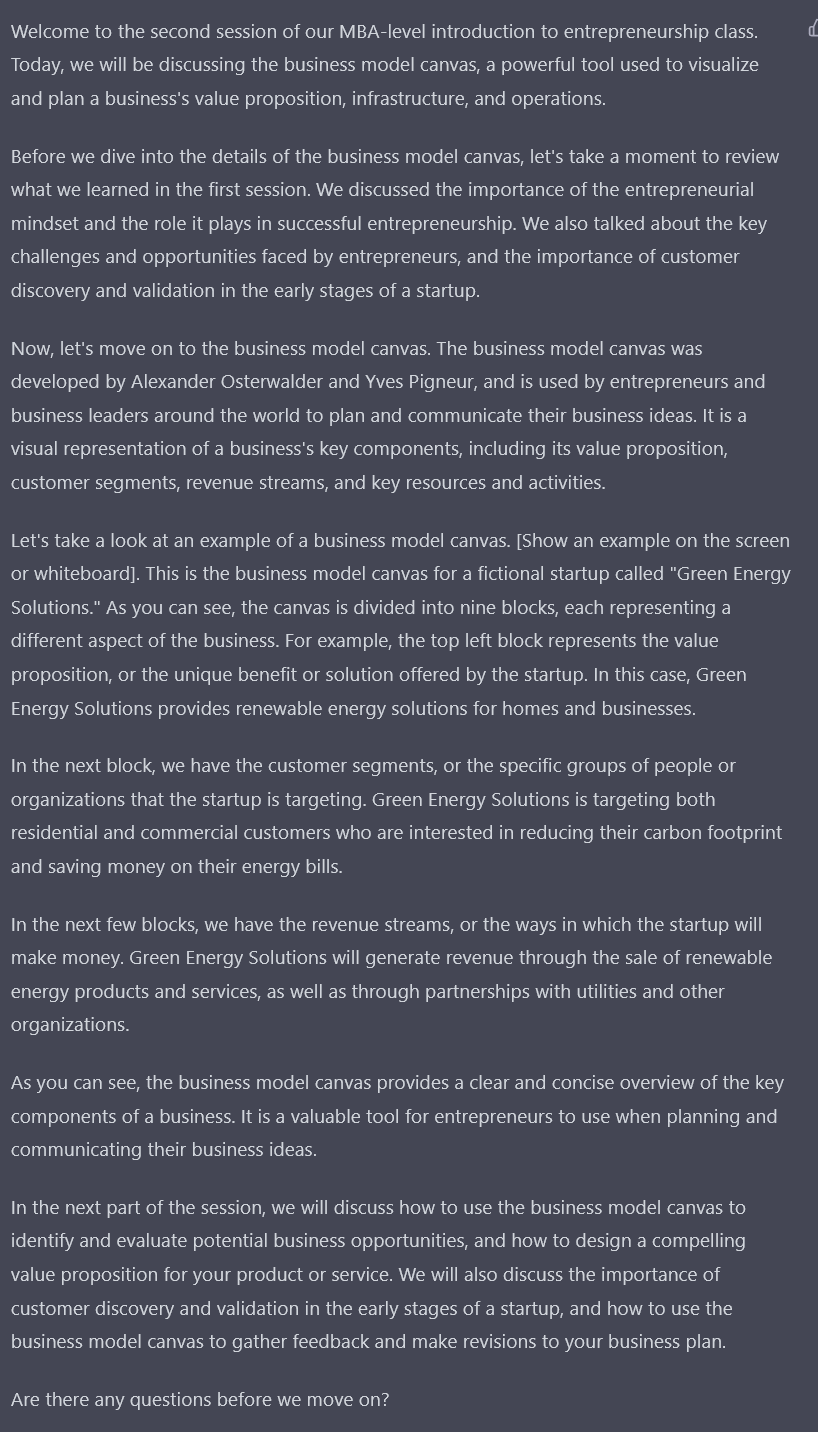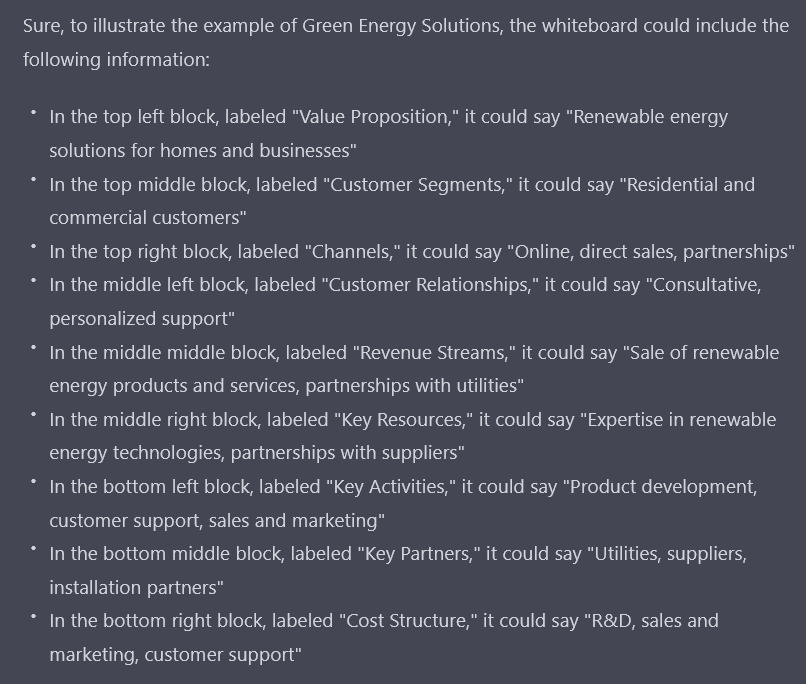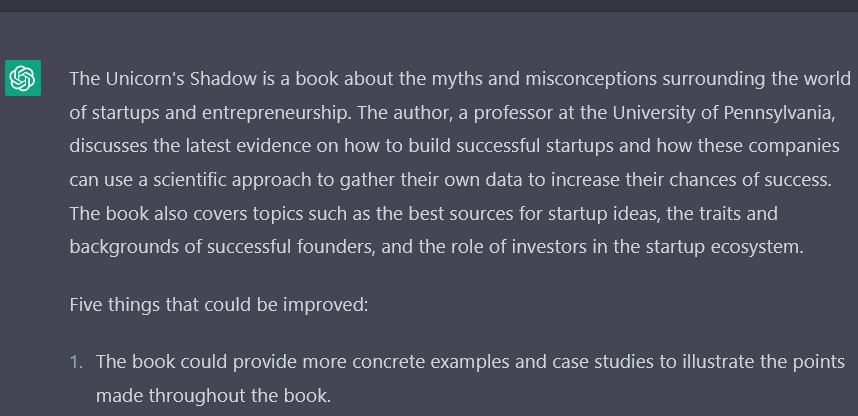The Mechanical Professor
I take a job I know well, and try to see how far I can automate it with AI.
If you have been reading this Substack, you may have noticed that, over the last week, I (and likely many other people you have heard from), have been obsessing over the public release of OpenGPT, an AI-powered chatbot. I am usually pretty hesitant to make technology predictions, but I think that this is going to change our world much sooner than we expect, and much more drastically. Rather than automating jobs that are repetitive & dangerous, there is now the prospect that the first jobs that are disrupted by AI will be more analytic; creative; and involve more writing and communication.
To demonstrate why I think this is the case, I wanted to see how much of my work an AI could do right now. And I think the results will surprise you. While not nearly as good as a human professor at any task (please note, school administrators), and with some clear weaknesses, it can do a shocking amount right now. But, rather than be scared of AI, we should think about how these systems provide us an opportunity to help extend our own capabilities. Think of it like having an intern, but one who just happens to work instanteously, can write both code and solid descriptive writing, and has a large chunk of the world’s knowledge in their brain. Maybe that isn’t the most helpful analogy, so let’s get into the details…
Teaching
We will start with a core duty of professors - teaching. I teach MBAs, executives, and undergraduates, but lets focus on MBAs for now. One of the classes I teach is an introductory startup class. Let’s see how well OpenAI does in creating a syllabus.
I ask it: Create a syllabus for a 12 session MBA-level introduction to entrepreneurship class, and provide the first four sessions. For each, include readings and assignments, as well as a summary of what will be covered. Include class policies at the end.
The results are impressive (I only show some of the sessions):
This is a perfectly fine syllabus for an introductory class for MBAs. The readings are reasonably modern (though it does not give page numbers, among other mistakes), and it actually has a reasonable structure building up to a final project.
However, if I were the kind of professor who wanted to assign my book, I might be disappointed it wasn’t included, so let me ask the AI to make a change: Could you add readings from Ethan Mollick’s The Unicorn’s Shadow?
Much better! (I am joking, but, honestly, the fact that it could do this was mind-blowing)
Now, lets ask it to create an assignment. Say a final business plan, a very typical concluding project for a class like this. I ask: great, could you create a final assignment, to create a business plan in teams. Show a table of the business plan elements and information on how many points each are worth, and how they will be evaluated
Again, not a particularly inspired assignment, but a very well done standard final business plan. But lets improve it a bit: can you do that again, but include the need to do customer interviews and conduct tests of their idea. explain what kinds of tests should be included. Also, we don't need value proposition, and team and management should be worth five points.
Great! Now, I am not going to waste your time showing you that it can grade an assignment according to a rubric, I have a whole Twitter thread showing that it can, and that it can provide comments as well. I would not say this are always as consistent as I would hope, but high-quality AI graders seem to be very likely.
But what about creating a lecture? Let me see what it can do: write the first part of the lecture for the second class. Include details. also a topical example. Have a warm tone.
I don’t use the Business Model Canvas myself (I have a whole HBR piece on why), but the detail here is pretty astonishing, and nothing is particularly wrong. There is even a worked example! Maybe we should learn a bit more about that: can you explain what should be written on the whiteboard to illustrate the Green Energy Solutions example?
What if I wanted to do something a bit cheesy to engage my students. Is there a way I could explain the Business Model Canvas with a rap?
I am so sorry about that. Let’s move on to…
Research
Spoiler alert: as of today, AIs can’t do original research, and AI isn’t that helpful with academic writing, so we can breathe a (temporary?) sigh of relief. Some of this is due to the limits of AI, but some is due to restrictions placed on ChatGPT to prevent it from making inaccurate guesses - so it will refuse to do citations, for example.
Even so, lets ask it about a topic I work on: I want to write an academic review paper on why crowdfunding can help entrepreneurship. Write me the introduction in an academic style for a top management journal. Explain why crowdfunding is a context that generalizes to the study of venture-backed companies, and what theories it can help explore.
Nothing particularly wrong, but also nothing good, and certainly not the start of a paper you should see in the management literature (though it may help overcome some writers block to have a few paragraphs to edit). There is something missing, though:
Better. (Sorry, academic joke. Couldn’t help myself.)
But if it can’t write articles for me, maybe it can write code? It turns out, it can do this quite well. For example, lets take everyone’s least favorite STATA command, reshape. I ask: create STATA code reshaping a dataset. The stem of the variable to be converted from wide to long is truthly. famid is the unique identifier for records in their wide format. reshape the suffix of truthly into a variable called year
Pretty cool. It can also code in many other languages. This is a potentially huge change to our research.
If your academic work involves writing books, or summarizing lots of data, you may find AI to be useful there, as well. I put the text of my book into ChatGPT and asked for a summary (the current ChatGPT demo cannot read the entire book because of size limits, so it was likely parsing the first chapters) I then asked it for improvements.
I then asked to write a new chapter that answered this criticism. Again, the results were not brilliant, and I wouldn’t vouch for their accuracy. but it could serve a basis for writing.
This will only continue to improve in the future, because writing is one thing this system does surprisingly well.
Outreach and Public Engagement
Professors are often called on to write editorials, commentaries and even tweets about their work. AI often shines at this. And it is happy to argue either side:
Write an opinion piece calling for crowdfunding to be deregulated.
Write an article on why crowdfunding should be more heavily regulated.
While neither article is perfect… they aren’t that bad as starting points, and each took less than a second to generate.
The Mechanical Professor?
If you didn’t see at least one example that amazed you, I would be surprised. This sudden advances in AI are stunning, and will impact writing and analytical work in a way that most of us never expected.
Now, obviously, there are many things academics do beyond those covered here, and it is not really possible to automate my job (right? right?), but all of these capabilities appeared in the last week, and the complexity of these systems are growing by an order of magnitude a year. So while I don’t think AI will replace academics, I do think we need to start to learn to use these systems to help us in our (often very complicated and busy) jobs, and, even more importantly, think about what this means for our students and alumni as we consider AI’s growth in the months and years ahead.



















It’s a game changer. I just rewrote my syllabus for an upcoming course. What I appreciated most: Perspective. My limits are my experience--ChatGPT provided ideas and direction I might have struggled to consider. The syllabus is now better as a result. My take: tools like this will become a “constant companion” much like spell and grammar checks, or the technology that enables my phone to automatically improve my inherent poor photography skills. Thanks for the inspiration!
I think the most interesting takeaways from this is that those who already know their stuff will find it easier to use this in their workflow and get even more productive.